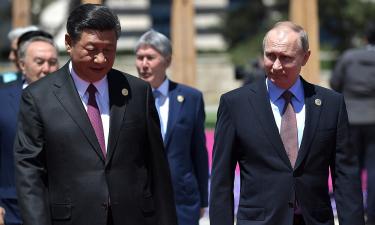Arab countries sent US President Joseph Biden away with a flea in his ear
Arab countries sent US President Joseph Biden away with a flea in his ear. The new generation of Arab rulers do not trust the United States as an ally.
Neither oil, nor Middle East comeback: Biden's visit to the region failed
President Joseph Biden's visit to the Middle East was touted as an event that it would "advance important American interests." At least, this is what Biden himself wrote in his column for The Washington Post.
First, the US president visited Israel, to which he promised $4 billion in aid, a "security umbrella" and Washington's determination not to exclude the Iranian Quds Force from the list of "terrorists."
Having moved to Palestine, Biden allocated only $500 million to it and said that the ground for the creation of two states was not yet ripe. Biden did not even try to discuss the construction of Israeli settlements, he did not criticise Al-Aqsa attacks, nor did he promise to return the US embassy from Jerusalem to Tel Aviv.
Biden's preferences for Israel became clear as a result of his subsequent meetings in Saudi Arabia, including with the leaders of the Arab countries of the region.
Oil matters, principles don't
Biden's visit to Saudi Arabia was undoubtedly of paramount importance in his entire tour. In Riyadh, he tried to convince the Saudis to increase oil production.
Last month, White House press secretary Karine Jean-Pierre said the president's stance on Saudi Arabia "remains in place," meaning that Biden considers the kingdom a "rogue state."
However, the 2018 murder of journalist Jamal Khashoggi was forgotten after sanctions against Russia pushed oil prices to their highest levels in eight years and US fuel prices — to historic highs.
Biden demonstrated disingenuous behavior:
- the visit to the Saudis was unofficial,
- it took place in Jeddah, rather than in the capital,
- Biden avoided shaking hands with Crown Prince Mohammed bin Salman,
- he resorted to bumping fists instead.
Yet, it was Bin Salman, the de facto leader of the country, who, according to US intelligence community, was behind the murder of Khashoggi.
Such disrespect for the prince could not end well for the United States.
Neither oil, nor Saudi military alliance with Israel
Biden eventually failed to gain support from Riyadh to increase oil production. He did not succeed in concluding a military alliance between Saudi Arabia and Israel either.
It turns out that the latter was required for Washington for its "return" to the region.
The Saudis only promised to increase oil production to 13 million barrels per day by 2027. As for the military axis between Israel and Arab countries of the region, Saudi Foreign Minister Prince Faisal bin Farhan said he was not aware of any discussions pertaining to the Gulf-Israeli defense alliance. The kingdom is not involved in such negotiations, he said.
The position is understandable, given that the US has maintained restrictions on the sale of offensive weapons to Riyadh (effected in February 2021) due to the war that the Saudis are waging in Yemen.
The outcome of Biden's voyage raises serious doubts in Democrats' success by congressional elections in November. They can hardly resist Iran and the influence of the Russian Federation and China in the Middle East too.
The new generation of Arab rulers have different ambitions, priorities and tasks. Lessons of the past have taught them that the United States is an unreliable ally, whereas Russia and China and even Iran are among those with whom it is possible to negotiate. It is no coincidence that the Saudis set out their desire to join the BRICS.
Strategically, USA's influence in the Middle East will continue decreasing, the Vedomosti wrote. Andrey Kortunov, the Director of the Russian International Affairs Council, believes that Biden's visit was not a total failure. Still, he has not been able to solve the main problems in relations between Washington and the Arab world. The Gulf monarchies still doubt that Washington considers the Middle East a priority in terms of security.
By and large, it is the United States that hinders the unity of the Arab states and Israel on the basis of the anti-Iranian agenda.
Biden was negotiating a return to the nuclear deal with Iran, which undermines confidence in American policy in the region. The Saudis, like other key players in the Middle East, will continue to balance between China, Russia and the United States, the expert believes. It is worthy of note that the United Arab Emirates took a neutral position regarding the crisis in Ukraine and did not join the anti-Russian sanctions.
Subscribe to Pravda.Ru Telegram channel, Facebook, RSS!





